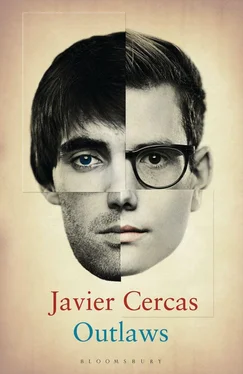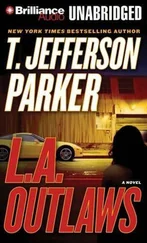‘I kept my mouth shut, but I knew that, in part, what he said was true. Zarco’s reputation in the prisons was terrible, and not only due to the resentment his fame and the privileges his fame brought with it caused: for years he had devoted himself to denouncing or insulting prison guards in books, documentaries and declarations to the press, branding them fascists and torturers and, in many of the incidents he’d been involved in, he’d attacked and taken many of them hostage; moreover, wherever he might be, Zarco meant a headache for the guards: they had to keep an eye on him, guarding him at all hours and treating him with the utmost consideration, which didn’t prevent him from constantly demanding his rights and constantly filing complaints against them. The result of all this was that, as soon as Zarco was sent to a new prison, all the guards who worked there plotted against him to make his life impossible. Yes or no, Gafitas? Zarco repeated. I answered with a gesture that meant: I’ll do what I can. This seemed to suffice; as if granting his consent he added: OK, now tell me how you plan to do it.
‘We devoted the rest of the interview to discussing the matter. I explained the defence strategy I’d sketched out over the past twenty-four hours. Zarco didn’t like it; we argued. I won’t go into details: they don’t matter. But there is one detail that does matter, a detail I intuited in a confusing way when we started arguing and by the time we finished seemed obvious. The detail is that there was something very contradictory in Zarco’s attitude. On the one hand, just as Tere had in my office, he had sought my complicity from the beginning and had treated me like a friend: just like Tere, he called me Gafitas, reclaiming in this way our old camaraderie; just like Tere, he corrected me each time I called him Zarco and asked me to call him Antonio, as if declaring that he was a man of flesh and blood and not a legend, a person and not a persona.
‘That, as I said, on the one hand. But on the other Zarco seemed to wish to establish distance, to put up a barrier of vanity between us. I mean that, at a certain moment — when we started to talk about his next trial and play the roles of a lawyer and his client — things changed, I noticed that he wasn’t prepared to let me forget that he was not just any old inmate, I felt that he wanted subtly to make me aware that I had never had nor would I ever have a client like him, who, although he was a man of flesh and blood, he was still a legend, and who, although he was a person, was still a persona. It’s not just that he tried to examine my knowledge of the law and argued with me over judicial particulars, even quoting the penal code a couple of times (both, by the way, incorrectly); this amused me and, to be honest, didn’t entirely surprise me: Zarco was famous for doing this kind of thing to his lawyers. What really shocked me was his arrogance, his haughtiness, the condescending impatience with which he listened to me, the tense conceit of some of his comments; I didn’t remember Zarco as stuck-up or self-important and, as I’ve always thought arrogance hid a feeling of inferiority, I soon interpreted this change as the clearest sign of Zarco’s helplessness. That’s also how I interpreted — as an indication of his private weakness, or his fragility — the way he displayed, in an almost high-handed way, his awareness of being a special inmate, of enjoying a special status in prison and of that being backed up by the prison authorities, because after all someone who knows himself to be strong doesn’t need to display his strength, don’t you think? Have you spoken with my friend Pere Prada yet? Zarco asked as soon as we started arguing about his defence. With whom? I asked. With my friend Pere Prada! he repeated, as if he couldn’t believe I didn’t know who he was. I soon remembered: Prada was the Catalan government’s director-general of prisons, the same man who, according to what Tere had told me the previous day, had taken an interest in Zarco’s case and facilitated his transfer to Gerona. No, I confessed, a little perplexed. Shit, what are you waiting for! Zarco urged me. Pere doesn’t know anything, but he’s in charge, I’ve got him wrapped around my little finger, he’s eating out of my hand now. Call him and he’ll tell you what you have to do. . Anyway. This was the essential contradiction that jumped out at me that first afternoon: Zarco both wanted and didn’t want to go on being Zarco, he wanted and didn’t want to bear the weight of his legend, his myth and his nickname, he wanted to be a person rather than a persona at the same time as wanting to be, as well as a person, a persona. None of what I heard Zarco say or saw him do from that day on refuted that contradiction or made me think he’d resolved it. Sometimes I think that’s what killed him.
‘When we finished talking that day, Zarco and I stood up to go — he back to his cell, me back to my office, or home — but I hadn’t left the visiting room when I heard: Hey, Gafitas. I turned around. Zarco was looking at me from the opposite corner of the room, with one hand on the knob of the half-open door. Have I said thanks yet? he asked. I smiled. No, I answered. But there’s no need. And I added: You scratch my back and I’ll scratch yours. Zarco stared at me for a couple of seconds; then he smiled too.’
‘Let me make one thing clear from the start. I don’t like talking to journalists, I don’t like talking about Antonio Gamallo, and what I like least of all is talking to journalists about Antonio Gamallo; in fact, this is the first time I’ve spoken of the matter with a journalist.’
‘I’m not a journalist.’
‘Aren’t you writing a book about Zarco?’
‘Yes, but. .’
‘Then it’s as if you were a journalist. I’ll tell you the truth: I wouldn’t have agreed to talk to you if it hadn’t been the daughter of a good friend of mine who asked me to, and because she promised my name would not appear in the book. I understand you’ll respect that promise.’
‘Of course.’
‘Don’t be offended: I don’t have anything against you personally; but I do have quite a bit against journalists. They’re a bunch of tricksters. They make things up. They lie. And, since they tell lies disguised as truths, people live in tremendous confusion. You take what they did to Gamallo, to Gamallo’s wife, to Ignacio Cañas; journalism is a meat-grinder: everyone gets crushed, and they’ll crush everything you put in front of them. They get nothing from me. Well. Now that we’ve got that clear, I’m at your disposal, although I have to warn you I spoke very little with Gamallo. There are lots of people who knew him much better than I did. By the way, have you already spoken with his wife?’
‘María Vela? She charges for interviews. Besides, everyone already knows her version, she’s told it a thousand times.’
‘True. And the other woman? Have you talked to her?’
‘You mean Tere?’
‘Yes. She could tell you lots of things; they say she’s known Gamallo all her life.’
‘I know. But she’s dead. She died a couple of weeks ago, near here, in Font de la Pòlvora.’
‘Ah.’
‘Did you know her?’
‘By sight.’
‘Look, I understand your reservations. I understand that you don’t want to make statements to the press. And that you don’t like talking about Zarco. But, as I said, I’m not a journalist, I don’t work for a radio or television station or write in a newspaper, and I’m not even sure I’m going to write about Zarco.’
‘You’re not?’
‘No. That was the idea at first, yes: to write a book about Zarco that denounced all the lies that have been told about him and tell the truth or a portion of the truth. But a person doesn’t write the books he wants to write, but those he can or those he finds, and the book I’ve found both is and isn’t that one.’
Читать дальше












